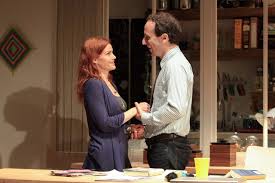Thérèse
Raquin is about as unrelentingly gothic as anything you are likely to see on
stage. It the sort of melodramatic tale that occasionally crops up
on PBS’s Masterpiece Theater or in some dark and dank bodice ripper of a movie
– the kind of thing that Saturday Night Live might have turned into a skit introduced
by Dan Aykroyd as Leonard Pinth-Garnell, host of “Bad Conceptual Theater.”
Our heroine (Keira Knightley, making her Broadway stage debut) has been
reared to be quietly tractable by a mildly annoying aunt (Judith Light, a treasure, even in this thankless role). The aunt, Madame Raquin, has
decided how perfectly lovely it would be for Thérèse to marry her son, Thérèse’s
doltish cousin Camille (Gabriel Ebert), so that the three of them can continue to live
together. Forever! Thérèse, who has spent her entire life without the least
expectation of experiencing any sort of pleasure, acquiesces out of sheer intertia.
Through most of Act I, Ms. Knightley's character is the embodiment of clinical depression, her demeanor rotating among various
facial expressions that include gawking, gaping, goggling, gazing, ogling,
staring, peering, and glaring. She has almost nothing to say as day after
dreary day passes by, even after Camille decides to drag everyone off to Paris
to live. (Who knew that the City of Lights could be so very gloomy).
Yet despite Beowulf Boritt’s elaborately bleak set design, Paris still manages
to work its magic on Thérèse, whose heart and loins suddenly spring to life when
she meets Laurent (Matt Ryan), an old friend of Camille. Before you can say
“Anna Karenina,” the pair is engaged in a hot and heavy affair, leading
inevitably to a plan to murder Camille – and from there to the sort of
consequences you would expect to occur in such a tale as this.
Director Evan Cabnet and the
cast – which also includes David Patrick Kelly, Jeff Still, and Mary Wiseman as
friends of the family who show up for weekly games of dominoes and who appear
to be oblivious to the goings-on – milk the play for every drop of gothic
atmosphere they can muster, and it certainly is unlike almost anything else I
can recall seeing through my many years of theatergoing.
British playwright Helen Edmundson's adaptation of Thérèse
Raquin (at the Roundabout Theater Company’s Studio 54) is a brave plunge into theatrical performing for the
sprightly Ms. Knightley (Pride &
Prejudice; The Pirates of the
Caribbean), but oh what a head scratcher it has all turned out to be.
Feel free to share this blog with your friends, and to offer up your own theater stories by posting a comment. I also invite you to check out the new website Show-Score.Com, where you will find capsule reviews of current plays from Yours Truly and many other New York critics.

